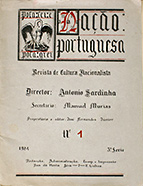

................................
Therefore, for the integralists—especially Sardinha—the revisionist task was considered to be of great importance in the process of restoring and renewing Portugal (António Sardinha, "Madre- Hispânia " [Mother Hispania], no. 2, 1924). In the context of this historical revisionism, the integralists glorified Viriato's Lusitania (Luís Chaves, "Nos tempos heroicos da Península /Viriato, Herói da Lenda e da Raça " [In the heroic times of the Peninsula/Viriato, Hero of Legend and Race], no. 3, 1928), the Reconquest of the Christians from the Moors, the imaginary administrative decentralisation that supposedly took place in the Portuguese Middle Ages, and the municipalist tradition (António Sardinha, "Teoria do Município / Exposição do problema I" [Municipal Theory/Problem Statement I], no. 7, 1923 and "Teoria do Município II/Do valor do localismo " [Municipal Theory II/The value of localism], no. 8, 1923) under the inspiration of an Herculanean idealisation of the Portuguese Middle Ages, the Henrican phase of the Discoveries, when the desire to expand the Christian faith or the crusading spirit was valued.
The recourse to memory, tradition, and national identity—expressed in headings/sections such as " Os Nossos Mestres" [Our Masters] and, above all, in the column that became frequent in all the issues after the 1st series, "Das Ideias , das Almas & dos Factos " [Regarding Ideas, Souls & Facts] and "Memento"—was always guided by a more practical aspect and the intervention in national political life, commenting, emphasising and questioning according to integralist ideology and doctrine.
The aim of Nação Portuguesa was to establish a programme subordinated to the defence of the traditionalist and anti-parliamentary organic monarchy, targeting two major tendencies: concentration (nationalism) and decentralisation. The concentrating tendency emphasises the personal power of the king as head of state, which includes the supreme governing function and the coordinating, supervisory, and supplementary function of local, regional, and professional municipalities. A decentralising tendency in the economic aspect (company, corporation, and economic nation or economic policy of the central government), the administrative family aspect (family, parish, municipality, and administrative nation, whose body was the National Assembly assisted by the general technical council); the judicial aspect (municipal court, provincial court, supreme court of justice, and superior council of the magistracy), and the spiritual aspect ("O que nós queremos " [What we want], no. 1, April 1914).
This work is financed by national funds through FCT - Foundation for Science and Technology, I.P, in the scope of the projects UIDB/04311/2020 and UIDP/04311/2020.
